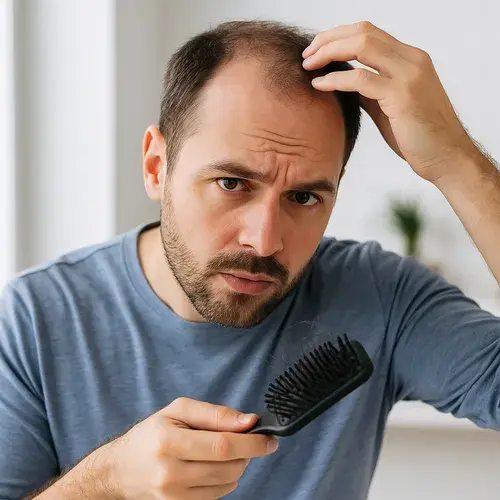When to See a Doctor for Hair Loss: Signs that Professional Help is Needed
Hair loss can signal underlying issues like infections or genetics. Early signs—sudden shedding, thinning, itchy or flaky scalp—warrant a doctor’s visit

Hair loss can be a distressing experience, affecting both men and women at any stage of life. While shedding 50 to 100 hairs per day is normal, certain signs indicate it’s time to seek professional help. Ignoring these signs could lead to more significant issues down the road. Consulting with a hair loss doctor early on allows you to pinpoint the cause and explore effective treatment options to regain control and prevent further loss. Sudden or Rapid Hair Loss One of the most noticeable signs that you need to see a doctor is sudden or rapid hair loss. This type of hair loss refers to a significant and noticeable shedding of hair over a short period, leading to visible thinning or bald spots. Unlike gradual hair thinning, this type of hair loss can appear almost overnight, often due to underlying health conditions or external factors. For instance, folliculitis is an infection or inflammation of the hair follicles that causes small, itchy bumps on the scalp, often accompanied by hair loss in affected areas. If left untreated, folliculitis can cause permanent damage to the hair follicles. A hair loss doctor can treat the infection with antibiotics or other medications to prevent further hair loss. Excessive Shedding Excessive shedding is another sign that you should consider consulting a hair loss doctor. If you notice that you are shedding more hair than usual, it could be a sign of an underlying issue. This excessive shedding might be accompanied by other symptoms such as itchy scalp or red, flaky patches. Thinning Hair in Specific Areas Thinning hair in specific areas can also indicate that you need professional help. This type of hair loss often occurs due to genetics, but it can also be caused by other factors like stress, illness, or certain medications. If you notice that your hair is thinning in specific areas such as the crown or temples, it's important to consult a doctor. Family History of Hair Loss A family history of hair loss is another significant sign that you should consider seeing a hair loss doctor. If your family members have experienced hair loss due to genetic conditions like male or female pattern baldness, you might be more likely to experience it as well. Early intervention can help manage the condition effectively. Itchy Scalp An itchy scalp accompanied by hair loss is a red flag that you should see a doctor. If your scalp is persistently itchy, irritated, or inflamed, and hair loss accompanies these symptoms, it's crucial to seek medical attention. Untreated scalp irritation can lead to permanent damage and further hair loss. Red, Flaky, or Bumpy Areas on the Scalp Red, flaky, or bumpy areas on the scalp along with hair thinning are other signs that indicate professional help is needed. These symptoms could be indicative of conditions like dandruff or psoriasis which can cause significant hair loss if left untreated. Chunks of Hair Coming Out If you notice chunks of hair coming out while washing or brushing your hair, it's time to see a doctor. This type of hair loss is often sudden and can be alarming. It could be due to various reasons including stress, hormonal changes, or underlying medical conditions. Impact on Wellbeing Finally, if hair loss is affecting your wellbeing and causing you to feel less confident or anxious, it's important to seek professional help. Hair loss can have a significant psychological impact, and addressing it early on can help alleviate these feelings. What to Expect at Your Appointment When you decide to see a hair loss doctor, you can expect an evaluation that includes examining your hair and scalp. The doctor may ask about your medical history, lifestyle, and any recent changes that could be contributing to the hair loss. Based on this information, they can determine what's causing the hair loss and recommend appropriate treatment options. In conclusion, while some degree of hair loss is normal, certain signs indicate that professional help is needed. By recognizing these signs early on—such as sudden or rapid hair loss, excessive shedding, thinning hair in specific areas, family history of hair loss, itchy scalp, red flaky or bumpy areas on the scalp, chunks of hair coming out—and seeking medical attention promptly, you can prevent further damage and explore effective treatment options to regain control over your hair health.
Need Professional Consultation?
Our professional doctors will provide detailed hair and scalp analysis and develop personalized treatment plans.
Book Consultation Now